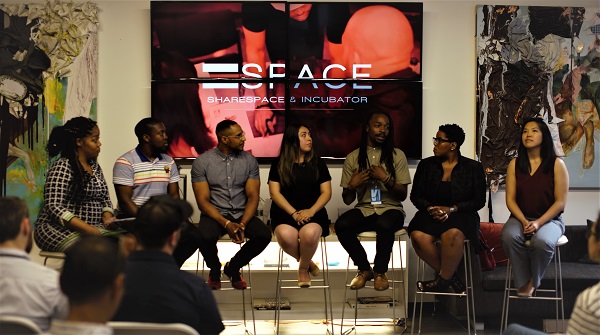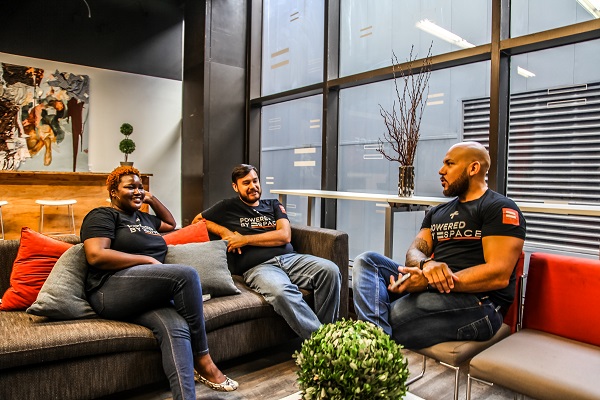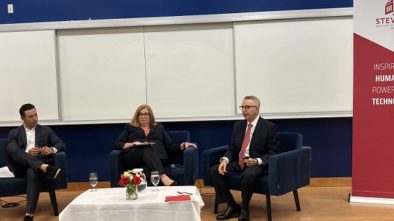Opinion: Make Your Space, Why Inclusive Coworking Spaces Matter
By: Akosua Ayim, Interim CEO of =SPACE
Making the choice to become an entrepreneur can be one of the most exhilarating, yet paralyzing, decisions ever. The ebb and flow of entrepreneurship — the ups and downs, wins and losses — are enough to shake anyone’s confidence.
Part of what keeps founders’ heads above water is our support system: cofounders, employees, advisers and others who share this intense experience. With about 30% of new businesses failing within the first two years (source: Small Business Administration, entrepreneurs need all the encouragement they can get!
In the past few years, founders have increasingly found themselves becoming inspired and have built a community within the walls of coworking spaces. These pockets of suites, desks, kitchenettes and coffee bars are more than physical spaces — they’ve become a part of many small business’s strategies for success. Coworking is about culture, motivation and connection.
But what happens when the spaces that are supposed to provide these things are culturally incompetent? We’ve recently seen several instances of prominent coworking spaces not being able to fulfill the needs of entrepreneurs of color, or of women and LGBTQ+ founders (even within spaces that were created specifically with one or more of these demographics in mind). Feeling uncomfortable, or worse, unwanted, in your workplace is a surefire way to erode productivity and innovation. And without these two things, any new business is already on the wrong path.
New Jersey has always been a hub for small business. In fact, there are over 850,000 small businesses in the state, which employ about 1.8 million people. New Jersey is also known for the diversity of its small businesses in comparison to other states, with a 30% increase in minority ownership since 2016.
While all of these companies may not have a need for a traditional coworking space, the landscape of New Jersey is certainly shifting, with a growing need, not only for shared spaces, but for more inclusive shared spaces. Spaces that not only say that they welcome everyone, but show their commitment to inclusion by providing amenities, programming and a network that is relevant and impactful to the powerful group of entrepreneurs that have always existed and continue to grow in this state.

=SPACE was founded about five years ago in Newark to address this exact need by CITI Medina and Rafael Roman, who saw a gap in the availability of space for marginalized founders. After coming home one day to an electricity bill that was through the roof (the result of welcoming founders throughout the city to work out of their home office), they decided they needed to create a permanent solution.
Like many startups owned by people of color, women and members of the LGBTQ+ community, =SPACE is a company that was built without traditional funding or financing. What began as a pop-up location has now grown to over 10,000 square feet across two floors in the center of downtown Newark. As soon as the elevator doors open, you are welcomed into a lobby that looks like it could be your own beautifully designed living room. Ours was crafted by the incredible Neffi Walker, and it’s partnerships like these that have allowed =SPACE to become a beacon for inclusivity and scalable, sustainable growth.
We know the numbers: Women founders receive 2.2 percent of venture capital funding, and less than 1 percent of that funding reaches women founders of color. Yet these demographics provide a return on investment up to three times faster than their counterparts. Places like =SPACE actively work to close this gap by providing programming, amenities and other resources that level the playing field.
But we don’t do this alone. Newark’s ecosystem works together to propel our startups forward. digitalundivided recently moved their headquarters to Newark, becoming a thought leader in New Jersey entrepreneurship. Their incubator and data-driven reporting has opened eyes around the country to just how lacking access is for marginalized founders, and what systemic changes need to happen to reverse the trend.
The New Jersey Economic Development Authority (NJEDA) hosted an inclusion roundtable in 2019, led by Tai Cooper (vice president, policy & communications), which brought together key stakeholders in the ecosystem and NJEDA leadership for an honest discussion around minority business owners being boxed out of resources despite providing irreplaceable value to the community.
Even competing coworking spaces within the state work together to provide resources that will benefit everyone in the long run. Newark Tech Week is hosted by =SPACE, but it involves the collaboration of other spaces, like Launchpad, Newark colleges and universities and our corporate and government sponsors (including phone.com, Newark Downtown District, the NJEDA and the Newark Alliance [Invest Newark]) that keep it relevant, impactful and free.
As the Interim CEO of =SPACE, nothing encourages me more than following the success of one of our founders or program participants. Witnessing that change in confidence, that ability to pitch and raise funds, or grow from mentee to mentor reinforces my view that we need spaces like ours, where founders can simply be without any stigmatization or lowered expectations.
Founders that identify as women of color or LGBTQ+ have always pushed the needle, forward, but have rarely had the support they need to soar. We’re changing that narrative at =SPACE, and we’ve seen the growth and wins firsthand, so we know that this is a critical piece of the puzzle.




